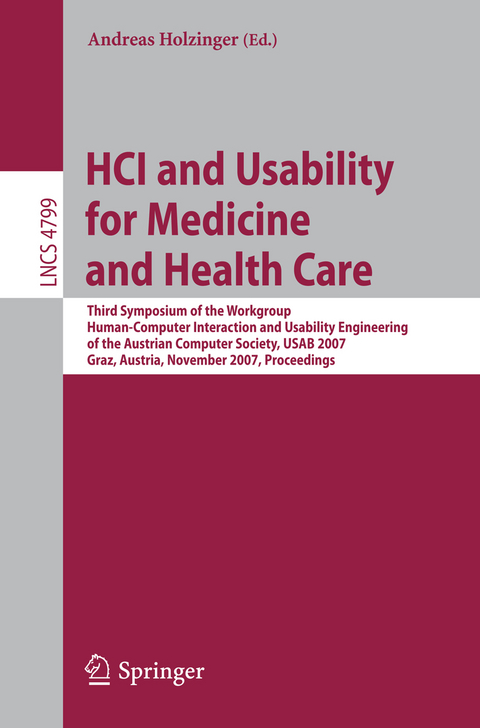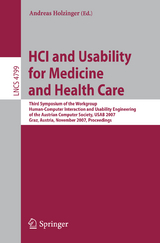HCI and Usability for Medicine and Health Care
Springer Berlin (Verlag)
978-3-540-76804-3 (ISBN)
Ing. Mag. rer. nat. Mag. phil. Dr. phil. Andreas Holzinger, geb. 1963 in Graz, Radio- und Fernsehtechniker, Industrietätigkeit in der Informationstechnik, Werkmeister für Industrielle Elektronik und Lehrlingsausbilderprüfung. College of Further Education Bournemouth (England) mit Schwerpunkt Computertechnik. Studien der Nachrichtentechnik, Physik und Psychologie sowie Medienpädagogik und Soziologie an der TU und Uni Graz. Promotion mit 'summa cum laude' auf dem Gebiet der Kognitionswissenschaft. Hochschullehrer am Institut für Informationsverarbeitung und computergestützte neue Medien der TU-Graz. Vorstandsassistent am Institut für medizinische Informatik, Statistik und Dokumentation. Konsulent des österreichischen Wissenschaftsministeriums. Österreichischer Experte in der Europäischen Union im Bereich Multimedia (eEurope). Dr. Holzinger forscht, arbeitet und lehrt in den Gebieten: Informationssysteme, Multimedia, Human-Computer-Interaction, Internet/Intranet, Intelligente Tutorielle Systeme.
Formal Methods in Usability Engineering.- User-Centered Methods Are Insufficient for Safety Critical Systems.- Improving Interactive Systems Usability Using Formal Description Techniques: Application to HealthCare.- Using Formal Specification Techniques for Advanced Counseling Systems in Health Care.- System Analysis and Methodologies for Design and Development.- Nurses' Working Practices: What Can We Learn for Designing Computerised Patient Record Systems?.- Organizational, Contextual and User-Centered Design in e-Health: Application in the Area of Telecardiology.- The Effect of New Standards on the Global Movement Toward Usable Medical Devices.- Usability of Radio-Frequency Devices in Surgery.- BadIdeas for Usability and Design of Medicine and Healthcare Sensors.- Physicians' and Nurses' Documenting Practices and Implications for Electronic Patient Record Design.- Ambient Assisted Living and Life Long Learning.- Design and Development of a Mobile Medical Application for the Management of Chronic Diseases: Methods of Improved Data Input for Older People.- Technology in Old Age from a Psychological Point of View.- Movement Coordination in Applied Human-Human and Human-Robot Interaction.- An Orientation Service for Dependent People Based on an Open Service Architecture.- Competence Assessment for Spinal Anaesthesia.- Visualization and Simulation in Medicine and Health Care.- Usability and Transferability of a Visualization Methodology for Medical Data.- Refining the Usability Engineering Toolbox: Lessons Learned from a User Study on a Visualization Tool.- Interactive Analysis and Visualization of Macromolecular Interfaces between Proteins.- Modeling Elastic Vessels with the LBGK Method in Three Dimensions.- Usability of Mobile Computing and Augmented Reality.-Usability of Mobile Computing Technologies to Assist Cancer Patients.- Usability of Mobile Computing in Emergency Response Systems - Lessons Learned and Future Directions.- Some Usability Issues of Augmented and Mixed Reality for e-Health Applications in the Medical Domain.- Designing Pervasive Brain-Computer Interfaces.- Medical Expert Systems and Decision Support.- The Impact of Structuring the Interface as a Decision Tree in a Treatment Decision Support Tool.- Dynamic Simulation of Medical Diagnosis: Learning in the Medical Decision Making and Learning Environment MEDIC.- SmartTransplantation - Allogeneic Stem Cell Transplantation as a Model for a Medical Expert System.- Framing, Patient Characteristics, and Treatment Selection in Medical Decision-Making.- The How and Why of Incident Investigation: Implications for Health Information Technology.- Research Methodologies, Cognitive Analysis and Clinical Applications.- Combining Virtual Reality and Functional Magnetic Resonance Imaging (fMRI): Problems and Solutions.- Cognitive Task Analysis for Prospective Usability Evaluation in Computer-Assisted Surgery.- Serious Games Can Support Psychotherapy of Children and Adolescents.- Development and Application of Facial Expression Training System.- Usability of an Evidence-Based Practice Website on a Pediatric Neuroscience Unit.- Ontologies, Semantics, Usability and Cognitive Load.- Cognitive Load Research and Semantic Apprehension of Graphical Linguistics.- An Ontology Approach for Classification of Abnormal White Matter in Patients with Multiple Sclerosis.- The Evaluation of Semantic Tools to Support Physicians in the Extraction of Diagnosis Codes.- Ontology Usability Via a Visualization Tool for the Semantic Indexing of Medical Reports (DICOM SR).- Agile Methodologies,Analytical Methods and Remote Usability Testing.- Fostering Creativity Thinking in Agile Software Development.- An Analytical Approach for Predicting and Identifying Use Error and Usability Problem.- User's Expertise Differences When Interacting with Simple Medical User Interfaces.- Usability-Testing Healthcare Software with Nursing Informatics Students in Distance Education: A Case Study.- Tutorial: Introduction to Visual Analytics.
| Erscheint lt. Verlag | 12.11.2007 |
|---|---|
| Reihe/Serie | Lecture Notes in Computer Science | Programming and Software Engineering |
| Zusatzinfo | XVI, 458 p. |
| Verlagsort | Berlin |
| Sprache | englisch |
| Maße | 155 x 235 mm |
| Gewicht | 708 g |
| Themenwelt | Mathematik / Informatik ► Informatik ► Betriebssysteme / Server |
| Informatik ► Software Entwicklung ► User Interfaces (HCI) | |
| Schlagworte | augmented reality • Bioinformatics • computer-based treatment • Conceptual Design • Decision Making • E-Health • elderly people • Expert System • Formal Method • formal methods • Hardcover, Softcover / Informatik, EDV/Betriebssysteme, Benutzeroberflächen • HCI • HC/Informatik, EDV/Betriebssysteme, Benutzeroberflächen • Health Care • Human Computer Interaction • Human-Computer Interaction (HCI) • Human Factors • interaction programming • interfaces • learning • Medical Informatics • medical ontology • mixed reality • Mobile Devices • Mobile Learning • Ontology • Pervasive Computing • Reasoning • semantic indexing • Semantics • Simulation • System Analysis • Usability • Usability Engineering • User Centered Design • user experiences • Virtual Reality • Visual Analytics • Visualization |
| ISBN-10 | 3-540-76804-1 / 3540768041 |
| ISBN-13 | 978-3-540-76804-3 / 9783540768043 |
| Zustand | Neuware |
| Haben Sie eine Frage zum Produkt? |
aus dem Bereich




